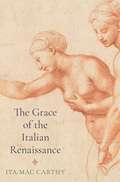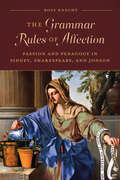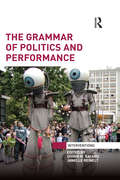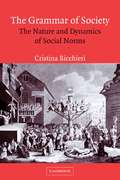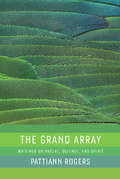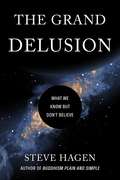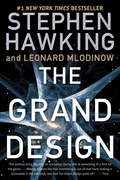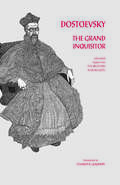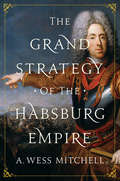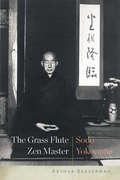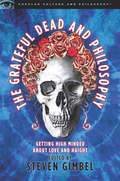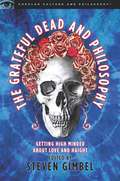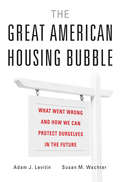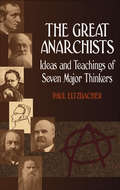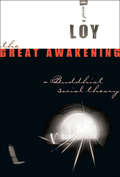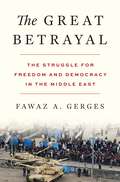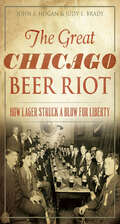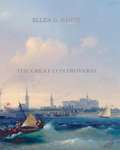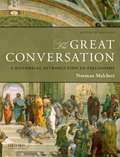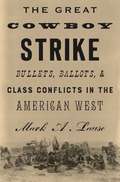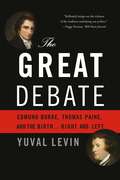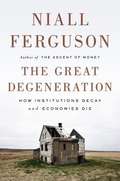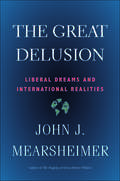- Table View
- List View
The Grace of the Italian Renaissance
by Ita Mac CarthyHow grace shaped the Renaissance in Italy"Grace" emerges as a keyword in the culture and society of sixteenth-century Italy. The Grace of the Italian Renaissance explores how it conveys and connects the most pressing ethical, social and aesthetic concerns of an age concerned with the reactivation of ancient ideas in a changing world. The book reassesses artists such as Francesco del Cossa, Raphael and Michelangelo and explores anew writers like Castiglione, Ariosto, Tullia d'Aragona and Vittoria Colonna. It shows how these artists and writers put grace at the heart of their work.Grace, Ita Mac Carthy argues, came to be as contested as it was prized across a range of Renaissance Italian contexts. It characterised emerging styles in literature and the visual arts, shaped ideas about how best to behave at court and sparked controversy about social harmony and human salvation. For all these reasons, grace abounded in the Italian Renaissance, yet it remained hard to define. Mac Carthy explores what grace meant to theologians, artists, writers and philosophers, showing how it influenced their thinking about themselves, each other and the world.Ambitiously conceived and elegantly written, this book portrays grace not as a stable formula of expression but as a web of interventions in culture and society.
The Grammar Rules of Affection: Passion and Pedagogy in Sidney, Shakespeare, and Jonson
by Ross KnechtRenaissance writers habitually drew upon the idioms and images of the schoolroom in their depictions of emotional experience. Memorable instances of this tendency include the representation of love as a schoolroom exercise conducted under the disciplinary gaze of the mistress, melancholy as a process of gradual decline like the declension of the noun, and courtship as a practice in which the participants are arranged like the parts of speech in a sentence. The Grammar Rules of Affection explores this synthesis of the affective and the pedagogical in Renaissance literature, analysing examples from major texts by Philip Sidney, William Shakespeare, and Ben Jonson. Drawing on philosophical approaches to emotion, theories of social practice, and the history of education, this book argues that emotions appear in Renaissance literature as conventional, rule-guided practices rather than internal states. This claim represents a novel intervention in the historical study of emotion, departing from the standard approaches to emotions as either corporeal phenomena or mental states. Combining linguistic philosophy and theory of emotion, The Grammar Rules of Affection works to overcome this dualistic crux by locating emotion in the expressions and practices of everyday life.
The Grammar of Politics and Performance (Interventions)
by Janelle Reinelt Shirin M RaiThis volume brings together important work at the intersection of politics and performance studies. While the languages of theatre and performance have long been deployed by other disciplines, these are seldom deployed seriously and pursued systematically to discover the actual nature of the relationship between performance as a set of behavioural practices and the forms and the transactions of these other disciplines. This book investigates the structural similarities and features of politics and performance, which are referred to here as ‘grammar’, a concept which also emphasizes the common communicational base or language of these fields. In each of the chapters included in this collection, key processes of both politics and performance are identified and analyzed, demonstrating the critical and indivisible links between the fields. The book also underlines that neither politics nor performance can take place without actors who perform and spectators who receive, evaluate and react to these actions. At the heart of the project is the ambition to bring about a paradigm change, such that politics cannot be analyzed seriously without a sophisticated understanding of its performance. All the chapters here display a concrete set of events, practices, and contexts within which politics and performance are inseparable elements. This work will be of great interest to students and scholars in both International Relations and Performance Studies.
The Grammar of Society: The Nature and Dynamics of Social Norms
by Cristina BicchieriIn The Grammar of Society, first published in 2006, Cristina Bicchieri examines social norms, such as fairness, cooperation, and reciprocity, in an effort to understand their nature and dynamics, the expectations that they generate, and how they evolve and change. Drawing on several intellectual traditions and methods, including those of social psychology, experimental economics and evolutionary game theory, Bicchieri provides an integrated account of how social norms emerge, why and when we follow them, and the situations where we are most likely to focus on relevant norms. Examining the existence and survival of inefficient norms, she demonstrates how norms evolve in ways that depend upon the psychological dispositions of the individual and how such dispositions may impair social efficiency. By contrast, she also shows how certain psychological propensities may naturally lead individuals to evolve fairness norms that closely resemble those we follow in most modern societies.
The Grand Array
by Pattiann RogersThe Grand Array is a stunning collection of 18 essays by widely published and highly acclaimed poet Pattiann Rogers. Written over a span of 25 years, these essays show Rogers daringly yet delicately laying out her vision of the essential unity and interdependence of science, spirituality, the arts, and the sensual experience of the physical world. Composed in an anecdotal and lyrical - but never dogmatic - style, The Grand Array takes us on a journey that both celebrates human existence and questions many of our basic concepts about nature, god, and the importance of faith. Regard for the awe-inspiring but sometimes raw mysteries of nature underlies Roger's writing. At its heart, her message is celebratory und unifying - and as such it's particularly relevant in today's fractured world. Rogers calls on us to understand and move beyond the limitations of our knowledge in order to embrace the vastness of the cosmos and the place of humans in its "grand array."
The Grand Array
by Pattiann RogersThe Grand Array is a stunning collection of 18 essays by widely published and highly acclaimed poet Pattiann Rogers. Written over a span of 25 years, these essays show Rogers daringly yet delicately laying out her vision of the essential unity and interdependence of science, spirituality, the arts, and the sensual experience of the physical world. Composed in an anecdotal and lyrical - but never dogmatic - style, The Grand Array takes us on a journey that both celebrates human existence and questions many of our basic concepts about nature, god, and the importance of faith. Regard for the awe-inspiring but sometimes raw mysteries of nature underlies Roger's writing. At its heart, her message is celebratory und unifying - and as such it's particularly relevant in today's fractured world. Rogers calls on us to understand and move beyond the limitations of our knowledge in order to embrace the vastness of the cosmos and the place of humans in its "grand array."
The Grand Array
by Pattiann RogersThe Grand Array is a stunning collection of 18 essays by widely published and highly acclaimed poet Pattiann Rogers. Written over a span of 25 years, these essays show Rogers daringly yet delicately laying out her vision of the essential unity and interdependence of science, spirituality, the arts, and the sensual experience of the physical world. Composed in an anecdotal and lyrical - but never dogmatic - style, The Grand Array takes us on a journey that both celebrates human existence and questions many of our basic concepts about nature, god, and the importance of faith. Regard for the awe-inspiring but sometimes raw mysteries of nature underlies Roger's writing. At its heart, her message is celebratory und unifying - and as such it's particularly relevant in today's fractured world. Rogers calls on us to understand and move beyond the limitations of our knowledge in order to embrace the vastness of the cosmos and the place of humans in its "grand array."
The Grand Delusion: What We Know But Don't Believe
by Steve HagenThis is a fun, unique book that goes deep into the great mysteries of knowing—and makes it enjoyable.In The Grand Delusion, bestselling author Steve Hagen drills deeply into the most basic assumptions, strengths, and limitations of religion and belief, philosophy and inquiry, science and technology. In doing so, he shines new light on the great existential questions—Why is there Something rather than Nothing? What does it mean to exist? What is consciousness? What is the nature of truth?—and does so from an entirely unexpected direction. Ultimately, this book reveals how all of our fundamental questions stem from a single error, a single unwarranted belief—a single Grand Delusion.
The Grand Design
by Stephen Hawking Leonard Mlodinow#1 NEW YORK TIMES BESTSELLERWhen and how did the universe begin? Why are we here? What is the nature of reality? Is the apparent "grand design" of our universe evidence of a benevolent creator who set things in motion--or does science offer another explanation? In this startling and lavishly illustrated book, Stephen Hawking and Leonard Mlodinow present the most recent scientific thinking about these and other abiding mysteries of the universe, in nontechnical language marked by brilliance and simplicity. According to quantum theory, the cosmos does not have just a single existence or history. The authors explain that we ourselves are the product of quantum fluctuations in the early universe, and show how quantum theory predicts the "multiverse"--the idea that ours is just one of many universes that appeared spontaneously out of nothing, each with different laws of nature. They conclude with a riveting assessment of M-theory, an explanation of the laws governing our universe that is currently the only viable candidate for a "theory of everything": the unified theory that Einstein was looking for, which, if confirmed, would represent the ultimate triumph of human reason.rning us and our universe that is currently the only viable candidate for a complete "theory of everything." If confirmed, they write, it will be the unified theory that Einstein was looking for, and the ultimate triumph of human reason.A succinct, startling, and lavishly illustrated guide to discoveries that are altering our understanding and threatening some of our most cherished belief systems, The Grand Design is a book that will inform--and provoke--like no other.From the Hardcover edition.
The Grand Inquisitor: with related chapters from The Brothers Karamazov
by Constance Garnett Fyodor Dostoevsky Charles GuignonThis new edition presents The Grand Inquisitor together with the preceding chapter, Rebellion, and the extended reply offered by Dostoevsky in the following sections, entitled The Russian Monk. By showing how Dostoevsky frames the Grand Inquisitor story in the wider context of the novel, this edition captures the subtlety and power of Dostoevsky's critique of modernity as well as his alternative vision of human fulfillment.
The Grand Strategy of the Habsburg Empire
by A. MitchellThe Habsburg Empire’s grand strategy for outmaneuvering and outlasting stronger rivals in a complicated geopolitical worldThe Empire of Habsburg Austria faced more enemies than any other European great power. Flanked on four sides by rivals, it possessed few of the advantages that explain successful empires. Its army was not renowned for offensive prowess, its finances were often shaky, and its populace was fragmented into more than a dozen ethnicities. Yet somehow Austria endured, outlasting Ottoman sieges, Frederick the Great, and Napoleon. The Grand Strategy of the Habsburg Empire tells the story of how this cash-strapped, polyglot empire survived for centuries in Europe's most dangerous neighborhood without succumbing to the pressures of multisided warfare.Taking readers from the War of the Spanish Succession in the early 1700s to the Austro-Prussian War of 1866, A. Wess Mitchell argues that the Habsburgs succeeded not through offensive military power or great wealth but by developing strategies that manipulated the element of time in geopolitical competition. Unable to fight all their enemies at once, the Habsburgs learned to use the limited tools at their disposal—terrain, technology, and treaty allies—to sequence and stagger their conflicts, drive down the costs of empire, and concentrate scarce resources against the greatest threat of the moment. Rarely holding a grudge after war, they played the "long game" in geopolitics, corralling friend and foe alike into voluntarily managing the empire's lengthy frontiers and extending a benign hegemony across the turbulent lands of middle Europe.A study in adaptive statecraft, The Grand Strategy of the Habsburg Empire offers lessons on how to navigate a messy geopolitical map, stand firm without the advantage of military predominance, and prevail against multiple rivals.
The Grass Flute Zen Master: Sodo Yokoyama
by Arthur BravermanWhat motivated Sodo–san to spend the last twenty years of his life in a “temple under the sky”— a corner of a public park where he taught passersby what it means to be forever young through the funky tunes he played on his grass flute? In The Grass Flute Zen Master: Sodo Yokoyama, we are seeking not only a truer understanding of this well–loved monk, but of zazen, Zen meditation, itself. In his search for insights into Sodo Yokoyama’s life, Arthur Braverman skillfully weaves a tapestry from seemingly disparate threads—the brief taisho period into which Sodo–san was born and where individualism shone; his teachers, both ancient and contemporary practitioners of Zen Bhuddism; the monk’s love of baseball; and the similarities Braverman finds between Sodo–san and Walt Whitman, who both found the universal in nature.Through conversations with Joko Shibata, Yokoyama’s sole disciple, and careful study of his teacher’s poetry, an intriguing tension between the personal and the universal is revealed. The Grass Flute Zen Master is a meditative examination not of just one life, but of many. The lineage of teacher and protégé is traced back through generations, contemporaries are drawn up from unexpected places, and Braverman examines his own long journey in Zen Buddhism; confronting his own expectations and surprising disappointments (the monk lived in a boarding house and later took a cab to his park when he could no longer walk the whole way) and the understanding and acceptance that followed. “When you play the leaf,” Sodo–san once wrote, “you’ll usually be a little out of tune. That’s where its very charm lies . . .”
The Grateful Dead and Philosophy
by Steve GimbelThis book is another one of those late-night Grateful Dead inspired dorm room conversations with friends . . . only this time it's your professors sitting cross-legged on the floor asking if anyone else wants to order a pizza.The Grateful Dead emerged from the San Francisco counter-culture movement of the late 1960s to become an American icon. Part of the reason they remain an institution four decades later is that they and their fans, the Deadheads, embody deviation from social, artistic, and industry norms. From the beginning, the Grateful Dead has represented rethinking what we do and how we do it. Their long, free-form jams stood in stark contrast to the three minute, radio friendly, formulaic rock that preceded them. Allowing their fans to tape and trade recordings of shows and distributing concert tickets themselves bucked the corporate control of popular music. The use of mind-altering chemicals questioned the nature of consciousness and reality. The practice of "touring," following the band from city to city, living as modern day nomads presented a model distinct from the work-a-day option assumed by most in our corporate dominated culture. As a result, Deadheads are a quite introspective lot.The Grateful Dead and Philosophy contains essays from twenty professional philosophers whose love of the music and scene have led them to reflect on different philosophical questions that arise from the enigma that is the Grateful Dead. Coming from a variety of perspectives, ancient and modern, Eastern and Western, The Grateful Dead and Philosophy considers how the Grateful Dead fits into the broader trends of American thought running through pragmatism and the Beat poets, how the parking lot scene with its tie-dyed t-shirt and veggie burrito vendors was both a rejection and embrace of capitalism, and whether Jerry Garcia and the Buddha were more than just a couple of fat guys talking about peace. The lyrics of the Grateful Dead's many songs are also the basis for several essays considering questions of fate and freedom, the nature-nurture debate, and gamblers' ethics.
The Grateful Dead and Philosophy: Getting High-Minded about Love and Haight
by Steven GimbelTwenty philosophical essays about the Grateful Dead phenomenon evaluates the band, its lyrics, and its influence from a variety of ancient and modern perspectives to consider how it fits into broader trends of American thought.
The Great American Housing Bubble: What Went Wrong and How We Can Protect Ourselves in the Future
by Susan M. Wachter Adam J. LevitinThe definitive account of the housing bubble that caused the Great Recession—and earned Wall Street fantastic profits. The American housing bubble of the 2000s caused the worst global financial crisis since the Great Depression. In this definitive account, Adam Levitin and Susan Wachter pinpoint its source: the shift in mortgage financing from securitization by Fannie Mae and Freddie Mac to “private-label securitization” by Wall Street banks. This change set off a race to the bottom in mortgage underwriting standards, as banks competed in laxity to gain market share. The Great American Housing Bubble tells the story of the transformation of mortgage lending from a dysfunctional, local affair, featuring short-term, interest-only “bullet” loans, to a robust, national market based around the thirty-year fixed-rate mortgage, a uniquely American innovation that served as the foundation for the middle class. Levitin and Wachter show how Fannie and Freddie’s market power kept risk in check until 2003, when mortgage financing shifted sharply to private-label securitization, as lenders looked for a way to sustain lending volume following an unprecedented refinancing wave. Private-label securitization brought a return of bullet loans, which had lower initial payments—enabling borrowers to borrow more—but much greater back-loaded risks. These loans produced a vast oversupply of underpriced mortgage finance that drove up home prices unsustainably. When the bubble burst, it set off a destructive downward spiral of home prices and foreclosures. Levitin and Wachter propose a rebuild of the housing finance system that ensures the widespread availability of the thirty-year fixed-rate mortgage, while preventing underwriting competition and shifting risk away from the public to private investors.
The Great Anarchists: Ideas and Teachings of Seven Major Thinkers
by Paul EltzbacherThis classic comparative study examines the thoughts of seven major writers on the subject of anarchy, using their own words to define the concept of anarchism, with subsidiary investigations of their ideology on the subjects of law, the state, and property. Three-quarters of this book consists of classified quotations from the seven writers — Godwin, Proudhon, Stirner, Bakunin, Kropotkin, Tucker, and Tolstoy; the author’s incisive commentary on each forms the balance of the text.An excellent introduction to anarchist theory and a convenient reference, this volume features a chronological presentation that clearly illustrates the theory’s historical development. The author selects the most important aspects of doctrine and matches them with revealing quotations. His choice of apt illustrations makes this compilation consistently interesting and enlightening, leaving readers with vivid and definite impressions of anarchistic teachings.
The Great Awakening
by David R. LoyThe most essential insight that Buddhism offers is that all our individual suffering arises from three and only three sources, known in Buddhism as the three poisons: greed, ill-will, and delusion. In The Great Awakening, scholar and Zen teacher David Loy examines how these three poisons, embodied in society's institutions, lie at the root of all social maladies as well. The teachings of Buddhism present a way that the individual can counteract these to alleviate personal suffering, and in the The Great Awakening Loy boldly examines how these teachings can be applied to institutions and even whole cultures for the alleviation of suffering on a collective level. This book will help both Buddhists and non-Buddhists to realize the social importance of Buddhist teachings, while providing a theoretical framework for socially engaged members of society to apply their spiritual principles to collective social issues. The Great Awakening shows how Buddhism can help our postmodern world develop liberative possibilities otherwise obscured by the anti-religious bias of so much contemporary social theory.
The Great Betrayal: The Struggle for Freedom and Democracy in the Middle East
by Fawaz A. GergesHow the Middle East can achieve political change and social progressThe Middle East is in upheaval: a widening chasm between state and society, the failure of governing elites to address citizens&’ genuine grievances, massive economic mismanagement—all made worse by repeated interventions by Western powers. Why has political change been so difficult to achieve? In The Great Betrayal, Fawaz Gerges argues that the convergence of political authoritarianism, meddling by the West, and the effects of prolonged regional conflicts have produced political paralysis and economic stagnation. The agency of everyday people has been thwarted by an authoritarian status quo that is maintained by a powerful partnership of external and internal forces.Gerges traces more than a century of consequential events in the region, from the end of the Ottoman Empire and the European carve-up of the Middle East to the Iranian Revolution and the Arab Spring uprisings. He shows how the people of the Middle East have been systematically denied self-determination, political representation, and effective government. Gerges finds that the region, with its diversity, variability, and volatility, defies abstract grand theories; previous accounts that have attributed the Middle East&’s problems to any one cause such as modernism, ignore the complexity and specificity of the issues. What can we learn from the Middle East&’s vexed history? Gerges is optimistic, declaring that the region&’s future will be determined not by dictators and their superpower patrons but by a growing population of Arab and Muslim youth who demand to be treated as citizens and not as subjects.
The Great Chicago Beer Riot: How Lager Struck a Blow for Liberty
by Judy E. Brady John F HoganAn &“exhaustive&” account of the pivotal incident between &“native-born Protestant Chicagoans who founded the city and newer German and Irish immigrants&” (Bloomberg). In 1855, when Chicago&’s recently elected mayor Levi Boone pushed through a law forbidding the sale of alcohol on Sunday, the city pushed back. To the German community, the move seemed a deliberate provocation from Boone&’s stridently anti-immigrant Know-Nothing Party. Beer formed the centerpiece of German Sunday gatherings, and robbing them of it on their only day off was a slap in the face. On April 21, 1855, an armed mob poured across the Clark Street Bridge and advanced on city hall. The Chicago Lager Riot resulted in at least one death, nineteen injuries and sixty arrests. It also led to the creation of a modern police department and the political alliances that helped put Abraham Lincoln in the White House. Authors Judy E. Brady and John F. Hogan explore the riot and its aftermath, from pint glass to bully pulpit.
The Great Controversy
by Ellen G. WhiteAs outspoken in his day as Richard Dawkins or Christopher Hitchens are today, American freethinker and author ROBERT GREEN INGERSOLL (1833-1899) was a notorious radical whose uncompromising views on religion and slavery (they were bad, in his opinion), women's suffrage (a good idea, he believed), and other contentious matters of his era made him a wildly popular orator and critic of 19th-century American culture and public life. As a speaker dedicated to expanding intellectual horizons and celebrating the value of skepticism, Ingersoll spoke frequently on such topics as atheism, freedom from the pressures of conformity, and the lives of philosophers who espoused such concepts. This collection of his most famous speeches includes the lectures: [ "The Gods" (1872) [ "Humboldt" (1869) [ "Thomas Paine" (1870) [ "Individuality" (1873) [ "Heretics and Heresies" (1874)
The Great Conversation: A Historical Introduction to Philosophy (Seventh Edition)
by Norman MelchertTracing the exchange of ideas between history's key philosophers, The Great Conversation: A Historical Introduction to Philosophy, Seventh Edition, demonstrates that while constructing an argument or making a claim, one philosopher almost always has others in mind. It addresses the fundamental questions of human life: Who are we? What can we know? How should we live? and What sort of reality do we inhabit? Author Norman Melchert provides a generous selection of excerpts from major philosophical works and makes them more easily understandable to students with his lucid and engaging explanations. Extensive cross referencing shows students how philosophers respond appreciatively or critically to thethoughts of other philosophers. The text is enhanced by two types of exercises - "Basic Questions" and "For Further Thought" - and numerous illustrations. The Great Conversation, Seventh Edition, is also available in two paperback volumes to suit your course needs. Volume I: Pre-Socratics through Descartes includes chapters 1-13 of the combined volume, while Volume II: Descartes through Derrida and Quine includes chapters 12-26.
The Great Cowboy Strike: Bullets, Ballots & Class Conflicts in the American West
by Mark LauseWhen cowboys were workers and battled their bossesIn the pantheon of American icons, the cowboy embodies the traits of “rugged individualism,” independent, solitary, and stoical. In reality, cowboys were grossly exploited and underpaid seasonal workers, who responded to the abuses of their employers in a series of militant strikes. Their resistance arose from the rise and demise of a “beef bonanza” that attracted international capital. Business interests approached the market with the expectation that it would have the same freedom to brutally impose its will as it had exercised on native peoples and the recently emancipated African Americans. These assumptions contributed to a series of bitter and violent “range wars,” which broke out from Texas to Montana and framed the appearance of labor conflicts in the region. These social tensions stirred a series of political insurgencies that became virtually endemic to the American West of the Gilded Age. Mark A. Lause explores the relationship between these neglected labor conflicts, the “range wars,” and the third-party movements. The Great Cowboy Strike subverts American mythology to reveal the class abuses and inequalities that have blinded a nation to its true history and nature
The Great Debate: Edmund Burke, Thomas Paine, and the Birth of Right and Left
by Yuval LevinFor more than two centuries, our political life has been divided between a party of progress and a party of conservation. In The Great Debate, Yuval Levin explores the origins of the left/right divide in America by examining the views of the men who best represent each side of that debate: Edmund Burke and Thomas Paine. In a groundbreaking exploration of the roots of our political order, Levin shows that American partisanship originated in the debates over the French Revolution, fueled by the fiery rhetoric of these ideological titans. Levin masterfully shows how Burke and Paine’s differing views continue to shape our current political discourse--on issues ranging from gun control and abortion to welfare and economic reform. Essential reading for anyone seeking to understand Washington’s often acrimonious rifts, The Great Debate offers a profound examination of what conservatism, liberalism, and the debate between them truly amount to.
The Great Degeneration: How Institutions Decay and Economies Die
by Niall FergusonFrom renowned historian Niall Ferguson, a searching and provocative examination of the widespread institutional rot that threatens our collective futureWhat causes rich countries to lose their way? Symptoms of decline are all around us today: slowing growth, crushing debts, increasing inequality, aging populations, antisocial behavior. But what exactly has gone wrong? The answer, Niall Ferguson argues in The Great Degeneration, is that our institutions--the intricate frameworks within which a society can flourish or fail--are degenerating.Representative government, the free market, the rule of law, and civil society--these are the four pillars of West European and North American societies. It was these institutions, rather than any geographical or climatic advantages, that set the West on the path to global dominance beginning around 1500. In our time, however, these institutions have deteriorated in disturbing ways. Our democracies have broken the contract between the generations by heaping IOUs on our children and grandchildren. Our markets are hindered by overcomplex regulations that debilitate the political and economic processes they were created to support; the rule of law has become the rule of lawyers. And civil society has degenerated into uncivil society, where we lazily expect all of our problems to be solved by the state.It is institutional degeneration, in other words, that lies behind economic stagnation and the geopolitical decline that comes with it. With characteristic verve and historical insight, Ferguson analyzes not only the causes of this stagnation but also its profound consequences. The Great Degeneration is an incisive indictment of an era of negligence and complacency. While the Arab world struggles to adopt democracy and China struggles to move from economic liberalization to the rule of law, our society is squandering the institutional inheritance of centuries. To arrest the breakdown of our civilization, Ferguson warns, will take heroic leadership and radical reform.
The Great Delusion: Liberal Dreams and International Realities
by John J. MearsheimerA major theoretical statement by a distinguished political scholar explains why a policy of liberal hegemony is doomed to fail In this major statement, the renowned international-relations scholar John Mearsheimer argues that liberal hegemony, the foreign policy pursued by the United States since the Cold War ended, is doomed to fail. It makes far more sense, he maintains, for Washington to adopt a more restrained foreign policy based on a sound understanding of how nationalism and realism constrain great powers abroad. It is widely believed in the West that the United States should spread liberal democracy across the world, foster an open international economy, and build institutions. This policy of remaking the world in America’s image is supposed to protect human rights, promote peace, and make the world safe for democracy. But this is not what has happened. Instead, the United States has ended up as a highly militarized state fighting wars that undermine peace, harm human rights, and threaten liberal values at home. Mearsheimer tells us why this has happened.
